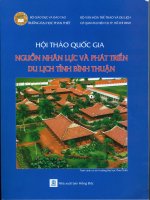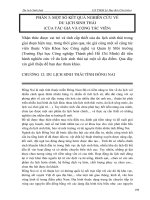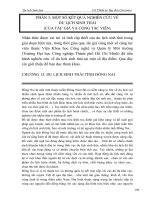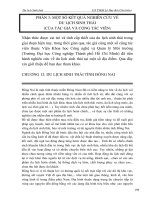SWOT analysis of Viet Nam ecotourism
Bạn đang xem bản rút gọn của tài liệu. Xem và tải ngay bản đầy đủ của tài liệu tại đây (39.09 KB, 5 trang )
Vietnam Tourism Report Q2 2011
© Business Monitor International Ltd Page 6
SWOT Analysis
Vietnam Tourism SWOT
Strengths
Proactive government policy approach, prioritising the tourism sector.
Major investment in Vietnam Airlines.
Weaknesses
The government is still prone to arbitrary and disruptive policy decisions at
microeconomic level.
The health service is still very rudimentary, deterring some foreign visitors.
Opportunities
Tax breaks offered to foreign investors.
Government is easing visa requirements.
The political turmoil in Thailand could encourage a shift in tourism towards Vietnam.
Threats
Other countries in the region are more established tourist destinations for
Westerners.
Recovery in other regional tourism markets could encourage a shift away from
Vietnam.
Vietnam Tourism Report Q2 2011
© Business Monitor International Ltd Page 7
Vietnam Political SWOT
Strengths
The Communist Party government appears committed to market-oriented
reforms, although specific economic policies were discussed at the 2011
National Congress in January. The one-party system is generally conducive to
short-term political stability.
Relations with the US are generally improving and Washington regards Hanoi as
a potential geopolitical ally in South East Asia.
Weaknesses
Corruption among government officials poses a major threat to the legitimacy of
the Communist Party.
There is increasing, albeit still limited, public dissatisfaction with the leadership’s
tight control over political dissent.
Opportunities
The government recognises the threat that corruption poses to its legitimacy,
and has acted to clamp down on graft among party officials.
Vietnam has allowed legislators to become more vocal in criticising government
policies, which is opening up opportunities for more checks and balances within
the one-party system.
Threats
The slowdown in growth in 2009 and 2010 is likely to weigh on public
acceptance of the one-party system and street demonstrations protesting
against economic conditions could develop into a full-on challenge to
undemocratic rule.
Although strong domestic control will ensure little change to Vietnam’s political
scene in the next few years, over the long term the one-party state will probably
be unsustainable.
Relations with China have deteriorated due to Beijing’s more assertive stance
over disputed islands in the South China Sea and domestic criticism of a large
Chinese investment in a bauxite mining project in the central highlands, which
could potentially cause widespread environmental damage.
Vietnam Tourism Report Q2 2011
© Business Monitor International Ltd Page 8
Vietnam Economic SWOT
Strengths
Vietnam has been one of the fastest growing economies in Asia in recent years,
with GDP growth averaging 7.6% per annum between 2000 and 2009.
The economic boom has lifted many Vietnamese out of poverty, with the official
poverty rate in the country falling from 58% in 1993 to 20% in 2004.
Weaknesses
Vietnam still suffers from substantial trade, current account and fiscal deficits,
leaving the economy vulnerable as the global economy continued to suffer in
2010. The fiscal picture is clouded by considerable ‘off the books’ spending.
The heavily managed and weak Vietnamese dong reduces incentives to
improve the quality of exports and also keeps import costs high, contributing to
inflationary pressure.
Opportunities
WTO membership has given Vietnam access to foreign markets and capital,
while making Vietnamese enterprises stronger through increased competition.
The government will, despite the current macroeconomic woes, continue to
move forward with market reforms, including privatisation of state-owned
enterprises and liberalising the banking sector.
Urbanisation will continue to be a long-term growth driver. The UN forecasts the
urban population to rise from 29% of the population to more than 50% by the
early 2040s.
Threats
Inflation and deficit concerns have caused some investors to reassess their
hitherto upbeat view of Vietnam. If the government focuses too much on
stimulating growth and fails to root out inflationary pressure then it risks
prolonging macroeconomic instability, which could lead to a crisis.
Prolonged macroeconomic instability could prompt the authorities to put reforms
on hold as they struggle to stabilise the economy.
Vietnam Tourism Report Q2 2011
© Business Monitor International Ltd Page 9
Vietnam Business Environment SWOT
Strengths
Vietnam has a large, skilled and low-cost workforce that has made the country
attractive to foreign investors.
Vietnam’s proximity to China and South East Asia, and its good sea links, make
it a good base for foreign companies to export to the rest of Asia, and beyond.
Weaknesses
Vietnam’s infrastructure is still weak. Roads, railways and ports are inadequate
to cope with the country’s economic growth and links with the outside world.
Vietnam remains one of the world’s most corrupt countries. Its score in
Transparency International’s 2010 Corruption Perceptions Index was 2.7,
putting it in 22
nd
place in the Asia Pacific region and 116
th
in the world.
Opportunities
Vietnam is increasingly attracting investment from key Asian economies such as
Japan, South Korea and Taiwan. This creates the possibility of the transfer of
high-tech skills and know-how.
Vietnam is pressing ahead with the privatisation of state-owned enterprises and
the liberalisation of the banking sector, which should offer foreign investors new
entry points.
Threats
Ongoing trade disputes with the US and the general threat of American
protectionism will remain concerns.
Labour unrest remains a lingering threat. Failure by the authorities to boost
skills levels could leave Vietnam as a second-rate economy for an indefinite
period.
Copyright of Vietnam Tourism Report is the property of Business Monitor International and its content may not
be copied or emailed to multiple sites or posted to a listserv without the copyright holder's express written
permission. However, users may print, download, or email articles for individual use.









